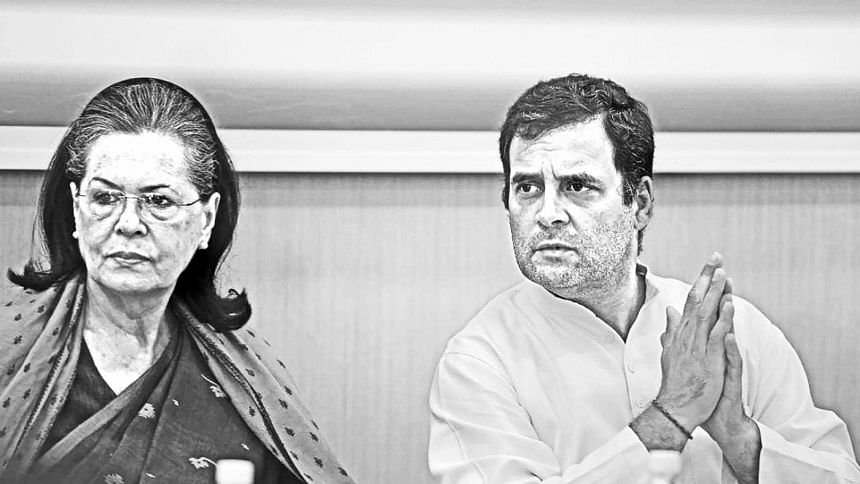Where does Congress go from here?

A few weeks before the campaigning for the Indian parliamentary polls ended, two key leaders of the Congress confided that the party should remain out of power for another 10 years in order to revive itself organisationally. One of them was from Rajasthan who occupies a key post in the party's government there and the other one was from Uttar Pradesh who was a former cabinet minister in Manmohan Singh's government. Obviously, the two leaders did not want to go on record as having said this. But their remark reflected the present condition within the Congress.
On May 25, 2019 when the Congress Working Committee, the party's top decision-making forum, met to review the electoral debacle, the party's General Secretary Ghulam Nabi Azad told the media that the party's loss in the elections did not constitute a defeat of its ideology but a defeat in the numbers game. What he left unsaid is that election in a democracy is all about numbers under the first-past-the-post system. And the numbers are unflattering for the Congress because they bring out the enormity of its crushing electoral defeat.
Rubbing salt into the wound, the party's President Rahul Gandhi himself lost the poll in Amethi—the first time a member of the Nehru-Gandhi clan was defeated in Amethi.
Just look at these statistics: i) the party suffered its second biggest loss in national polls in its 134-year history by getting just 52 of the 542 seats, eight more than in the previous election five years ago; ii) the party failed to get a single seat in 18 states and federally-administered territories this year—a sad plight for the Congress which has ruled India for 55 out of the last 72 years since its independence and had to its credit the highest number of seats (415) by any party in the 1984 general elections (aided by the huge outpour of sympathy in the wake of Indira Gandhi's assassination); iii) the party managed just one of the 80 seats in electorally the most crucial state of Uttar Pradesh in 2019 and; iv) the party is now consigned to the opposition bench for a decade (starting in 2014), its longest spell as the opposition party.
Statistics have their own story to tell. Rubbing salt into the wound, the party's President Rahul Gandhi himself lost the poll in Amethi—the first time a member of the Nehru-Gandhi clan was defeated in Amethi. Not only Rahul, a number of senior Congress leaders cutting across age suffered defeat in this election—Mallikarjun Kharge, who was the leader of the opposition in the Lok Sabha, M Veerappa Moily, Ashok Chavan, Digvijay Singh, Meera Kumar, Pawan Kumar Bansal, Jyotiraditya Scindia (a first-time loser), Milind Deora and Sushmita Deb among others. The only consolation for the Congress, if that is the word one may use, was in the southern part of India which accounted more than half of its 52 seats this time and in Punjab in the north.
Where does the Congress go from here? How does the party go about doing it after the shock of this huge defeat? Those are the most important questions being asked in political circles across India. But the Congress' way of doing business does not seem to have changed. Not immediately. That was why one saw the party going through the motion of the ritualistic exercise of Rahul Gandhi offering his resignation at the CWC meeting on May 25 and the party duly rejecting it by reiterating its faith in its leadership and authorising him to go for a thorough organisational overhaul of the party. The same script and the same drama had played out after its defeat in 2014 when Rahul's mother Sonia had volunteered to step down only to be stonewalled by the CWC. The more things change in the Congress, the more they remain the same. In 2014, the party had set up a committee led by veteran leader AK Antony to probe the electoral defeat. It submitted its report but no one knows whether any lesson was learnt. This time also we may see the same story being repeated.
It has been suggested by some political commentators that the Congress must reinvent itself. But the question is, should this reinvention happen to its ideology, or its leadership, or both? As far as the Congress leadership is concerned, there is a fundamental structural problem. Having been powered by the Nehru-Gandhi dynasty for its top leadership—Jawaharlal Nehru, Indira Gandhi, Rajiv Gandhi, Sonia Gandhi, Rahul Gandhi and Priyanka Gandhi Vadra—the Congress today is left struggling to find a second line of leadership that was never allowed to be built up over decades. In fact, so overbearing has been the presence of the family down the generations that no one else was allowed to find his or her way through the rank to the summit of the party.
A tell-tale symptom of the structural lacunae of the Congress is reflected in the manner in which Priyanka was brought into the party as a General Secretary just a few months before the elections and put in charge of party affairs in the economically impoverished eastern region of Uttar Pradesh. Priyanka being parachuted to the leadership position overnight even as lakhs of party workers and leaders in the lower and middle rungs of the party hierarchy are toiling for years only buttresses the BJP's criticism against the Congress that it is dynasty-centric. It also drives home once again the sense of entitlement of the Gandhi family members to the Congress leadership. What difference did Priyanka make to the Congress? She campaigned extensively in Uttar Pradesh, including in Amethi, and the party could win only one seat. Outside Uttar Pradesh, she campaigned in 12 constituencies and the party was defeated in 11 of them. It is time for the Congress leadership to introspect if the days of vote-catching ability and the appeal of the Gandhi family charisma are over or not, because at least three to four generations of new voters have come up since the time of Indira and Rajiv.
By contrast, after the Atal Bihari Vajpayee-LK Advani era ended in the Bharatiya Janata Party, one saw Narendra Modi and Amit Shah emerging all the way from the lowest strata of the party and taking over the mantle. Modi is already 69 and indications are that he has already focused on the next line of leadership which he is going to put in place in his second term as the supreme leader of the party and the government and turn the BJP into a natural party of governance, a tag which the Congress had once enjoyed.
Ideologically, the Congress, essentially a centrist party, kept swinging between a slight tilt to the right and the left. Before winning the assembly polls in the three heartland states of Rajasthan, Madhya Pradesh and Chhattisgarh last year, the party had sent out a strong message of soft Hindutva—Rahul undertaking a pilgrimage to the Mount Kailash, the abode of Lord Shiva, and prior to that visiting several temples and the party in Madhya Pradesh making a number of promises relating to protection of cows, which Hindus revere, and recreating the path of Lord Rama's journey to exile. But all this was missing before the parliamentary poll when the party took an activist's approach by promising in its manifesto the scrapping of the sedition law and the stringent Armed Forces Special Powers Act that have come under fire from the Left and the liberal sections of Indian society. Was this the right strategy to cope with a highly-polarised campaign narrative of nationalism, national security and Hindutva set by the BJP by highlighting issues of Pulwama terror attack, retaliatory Indian air-strike on a terror camp in Pakistan and National Register of Citizens and Citizenship Amendment Bill?
The Congress manifesto did promise pro-poor social welfare schemes and a cash of Rs 72,000 per year for the poorest but those were on paper, quite naturally being the opposition party, while the BJP government responded by implementing measures like dole-outs for farmers facing agrarian distress and supply cooking gas and clean toilets and electricity to villages and small cities. The people thought that one in hand is better than the two in the bush.
In the immediate future, the Congress has more electoral battles in hand—assembly polls in Maharashtra and Haryana and thereafter in West Bengal, Punjab and Delhi in the next two years. The party is now in power in just five states, its pan-India presence having shrunk considerably since 2014. Any further defeat would make the party come close to fulfilling Amit Shah's proclamation of a "Congress-mukt Bharat."
Pallab Bhattacharya is a special correspondent forThe Daily Star.
Follow The Daily Star Opinion on Facebook for the latest opinions, commentaries and analyses by experts and professionals.
To contribute your article or letter to The Daily Star Opinion, see our guidelines for submission.

 For all latest news, follow The Daily Star's Google News channel.
For all latest news, follow The Daily Star's Google News channel. 



Comments